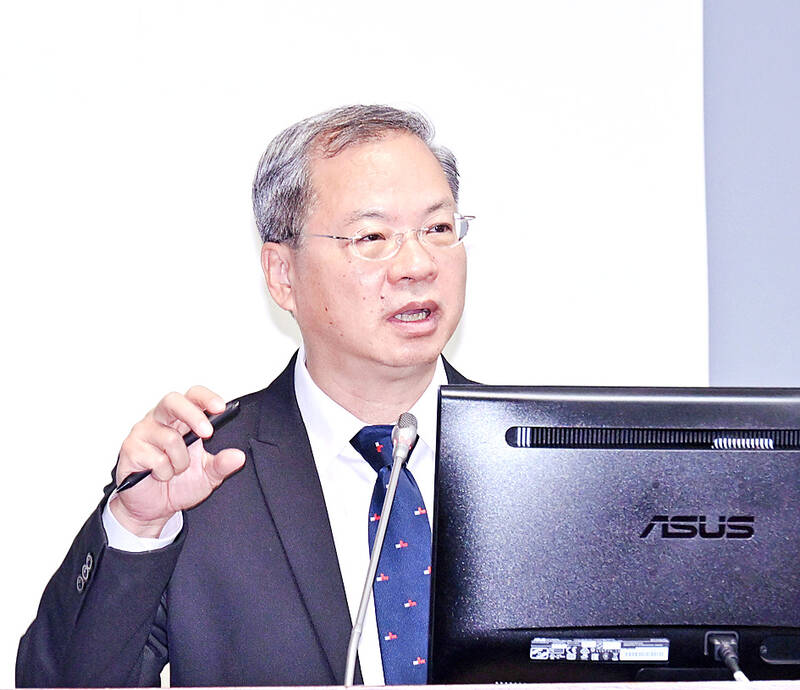National Development Council (NDC) Minister Kung Ming-hsin (龔明鑫) was questioned in the Legislative Yuan in Taipei yesterday about a National Development Fund-supported silicon photonics chip start-up reportedly being in touch with Chinese officials to transfer its core technology.
Kung was questioned by several Democratic Progressive Party lawmakers at a meeting of the Economics Committee about a local report last week, which alleged to have received tips from board members and employees of Taiwan Nano & Micro-Photonics Co (台灣奈微光科技) that the chairman had been in contact with Chinese officials.
It said that the start-up, established in 2019 and receiving an angel investment of NT$17.63 million (US$546,887 at the current exchange rate) from the National Development Fund, was generously offered about NT$23 billion to set up a foundry in China to mass-produce the company’s state-of-the-art innovation.

Photo: Fang Pin-chao, Taipei Times
The company’s setup was based on National Taiwan University (NTU) electrical engineering and computer science professor Lin Ching-fuh (林清富) and his team’s work and patent on a photodetector for measuring infrared radiation, according to the report. Lin currently serves as the company’s chief technology officer.
According to the NTU College of Electrical Engineering and Computer Science’s announcement in 2021, the photodetector technology-based silicon photonics chip is able to detect “far and mid-infrared, near-infrared, and visible light.”
It added that the company was the world’s first sensing integrated optical circuit (IOC) design company to have its chips mass-produced using a silicon wafer CMOS process.
The company in October last year said it was ready to mass-produce its “multifunctional, far- and mid-infrared silicon photonics chip.”
Local media outlet Mirror Media reported that Lin had said the technology could be used in military and aerospace industries, electric vehicles and medicine, and therefore had the potential to become Taiwan’s next major technological stronghold.
The tips received by Mirror Media had accused company chairman Chang Kun-yu (張坤昱) of trying to transfer the technology to China. The report cited as evidence several screenshots of Chang’s message to board members and copies of Chinese official reports on the plan to make investments in the company.
The National Development Council, a day after the report had been published on Tuesday last week, issued a statement stressing that in the same report the company had already denied that the patent had been transferred or that it had any plans to set up factories in China or any other countries.
The council said the National Development Fund has a 4.93 percent stake in the company and has no one on its board.
“To our understanding, [the technology] of the company is still at the R&D [research and development] stage,” the statement said.
Kung repeated the stance yesterday when questioned by the lawmakers, who called it a “national security issue,” adding that the company also denied the report when the council contacted it about the report.
He said the council holds no investigative power, but would submit a report on the matter to the committee within a month.
The Mirror Media report said that the whistle-blowers had already reported the alleged offense to the Investigation Bureau of the Ministry of Justice.

Semiconductor business between Taiwan and the US is a “win-win” model for both sides given the high level of complementarity, the government said yesterday responding to tariff threats from US President Donald Trump. Home to the world’s largest contract chipmaker, Taiwan Semiconductor Manufacturing Co (TSMC, 台積電), Taiwan is a key link in the global technology supply chain for companies such as Apple Inc and Nvidia Corp. Trump said on Monday he plans to impose tariffs on imported chips, pharmaceuticals and steel in an effort to get the producers to make them in the US. “Taiwan and the US semiconductor and other technology industries

SMALL AND EFFICIENT: The Chinese AI app’s initial success has spurred worries in the US that its tech giants’ massive AI spending needs re-evaluation, a market strategist said Chinese artificial intelligence (AI) start-up DeepSeek’s (深度求索) eponymous AI assistant rocketed to the top of Apple Inc’s iPhone download charts, stirring doubts in Silicon Valley about the strength of the US’ technological dominance. The app’s underlying AI model is widely seen as competitive with OpenAI and Meta Platforms Inc’s latest. Its claim that it cost much less to train and develop triggered share moves across Asia’s supply chain. Chinese tech firms linked to DeepSeek, such as Iflytek Co (科大訊飛), surged yesterday, while chipmaking tool makers like Advantest Corp slumped on the potential threat to demand for Nvidia Corp’s AI accelerators. US stock

The US Federal Reserve is expected to announce a pause in rate cuts on Wednesday, as policymakers look to continue tackling inflation under close and vocal scrutiny from US President Donald Trump. The Fed cut its key lending rate by a full percentage point in the final four months of last year and indicated it would move more cautiously going forward amid an uptick in inflation away from its long-term target of 2 percent. “I think they will do nothing, and I think they should do nothing,” Federal Reserve Bank of St Louis former president Jim Bullard said. “I think the

SUBSIDIES: The nominee for commerce secretary indicated the Trump administration wants to put its stamp on the plan, but not unravel it entirely US President Donald Trump’s pick to lead the agency in charge of a US$52 billion semiconductor subsidy program declined to give it unqualified support, raising questions about the disbursement of funds to companies like Intel Corp and Taiwan Semiconductor Manufacturing Co (台積電). “I can’t say that I can honor something I haven’t read,” Howard Lutnick, Trump’s nominee for commerce secretary, said of the binding CHIPS and Science Act awards in a confirmation hearing on Wednesday. “To the extent monies have been disbursed, I would commit to rigorously enforcing documents that have been signed by those companies to make sure we get